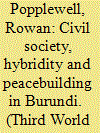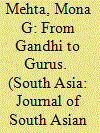| Srl | Item |
| 1 |
ID:
164034


|
|
|
|
|
| Summary/Abstract |
Critics argue that liberal peacebuilding has resulted in the creation of a civil society populated with organisations that are artificial and externalised. These associations are contrasted with more locally-based groups that are considered to be more authentic and better able to build a hybrid peace that is emancipatory. At first glance, this characterisation appears to describe civil society in post-war Burundi, but on closer inspection a much more complex and interesting picture is revealed which challenges existing conceptualisations of post-conflict civil society. The paper finds that even associations that are deeply rooted in local communities are composites forged through their encounters with the global. Furthermore, this hybridity is not new. Rather it is the product of decades of prior hybridisation, raising important questions about the authenticity and legitimacy of these organisations and, ultimately, their ability to promote a peace that is transformative.
|
|
|
|
|
|
|
|
|
|
|
|
|
|
|
|
| 2 |
ID:
154551


|
|
|
|
|
| Summary/Abstract |
This article compares the public sphere of gurus (‘guru-sphere’) in contemporary Gujarat and that of Gandhi historically as important sites of political contestation. It argues that despite their common use of religious idioms to convey political ideas, Gandhi and the gurus authorise radically different political projects with divergent conceptions of the Hindu subject and Indian polity. The discursive activities of the guru-sphere have helped forge a dominant consensus that endorses Hindutva politics. Operating within a democratic civil society and borrowing from Gandhian idioms, gurus have actively challenged key constitutional values derived from the Gandhian public sphere. The study reveals the paradoxical tendency of Gujarat's public sphere to produce hegemonic monologues over pluralistic dialogues, not in the absence of, but through the institutional mechanisms of, deliberative democracy.
|
|
|
|
|
|
|
|
|
|
|
|
|
|
|
|